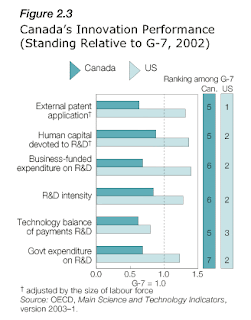When I went about tackling the Liberal track record on the economy I thought it would be fairly difficult. After all, if there were glaring discrepancies I'm sure the public media would have picked it up...
My thought process was very simple:
1. Is the average person better off today?
2. Will the average person be better off tomorrow?
Wealth DistributionSo, we all know that since the economy is better and GDP has increased, the Average Joe is better off... correct? After all, the expected result of an improved economy is a better standard of living for all. Well, according to Stats Canada
research on wealth distribution this is not the case:
"In 1984, young families with children - that is, those in which the major income recipient was aged between 25 and 34, had a median net worth of $44,000, according to the Assets and Debts Survey. In 1999, the SFS showed that this net worth had declined 30% to $30,800."Furthermore, Stats Canada goes on to make the following clear conclusions from their research:
"only the 10th (and for some samples, the 9th) decile has increased its share of total net worth".Other research shows similar patterns. Saezz and Vaell show conclusive growth in inequality in Canada upto the year 2000, with peak gains in the Liberals stalwart years:

From 1999 to 2005 the economic boom continues. According to the 2005 Survey of Financial Security published
here by Stats Canada family net worth has increased by a further 23%!
But of course the trend is more of the same - the rich get richer, the poor get poorer. From 1999 to 2005 the stats are:
"Family units in the top 20% of the
wealth distribution had a median net worth of about $862,900 in 2005, up 28.5% from 1999. The 20% at the low end
of the net worth scale had a median value of $1,000, a 9.1% decline from 1999."What about the middle class from 1999 to 2005?
Increase in wealth - 8.4%
Inflation - 15.2%
 Sure is hard to afford a Molson Blueport round hereDebt Reduction
Sure is hard to afford a Molson Blueport round hereDebt ReductionIn the end though maybe one could accept poor wealth distribution if money was being kicked back into paying down the debt, which would help reduce tax and increase net worth across the board for future generations. After all, the Liberals were the great budget managers of our era. They brought the deficit in-line and wrangled Canadian books into an unprecedented era of surplus.
Right??
Gross Debt March 31, 2001 - $613B
Gross Debt March 31, 2002 - $632B
Gross Debt March 31, 2003 - $695B
Gross Debt March 31, 2004 - $701B
Gross Debt March 31, 2005 - $701B
Gross Debt March 31, 2006 - $705B
Wait, something isn't adding up?
These numbers come from the Annual Debt Management Strategy Reports prepared by Finance Ministers. They are all signed by Paul Martin or Ralph Goodale.
 Yes, Mr. Speaker, I know I'm lying... but its ok... we have a majority and Izzy Asper owns the media!
Yes, Mr. Speaker, I know I'm lying... but its ok... we have a majority and Izzy Asper owns the media!Read all of Paul Martin's speeches, the debt never fell, the debt to GDP ratio fell... obviously since the GDP was rising! Or he talked about how debt services fell as a percentage of taxes... well of course, interest rates plumetted in the same period!
Liberal debt management is one of the biggest marketing scams in the history of governance.New MarketsWell then at least if the Liberals were unable to extend the red hot economy into the pockets of the common man... and if at least they weren't able to pay down the debt and look after future generations... I'm sure they were at least able to properly invest in research and development to ensure Canada could readily position itself in new markets and economic opportunities. In the 19990s new markets for economic activity were opened by the 'knowledge-based economy' and the internet. Canada, quite frankly, "missed the boat" as stated by Icelandic economist Manuel Trajtenberg in a comparison of G7 countries.
Stats Canada's own research shows this, in the G7 Canada has the second lowest share of patents:

In addition to patent output, the Liberals also repeatedly underinvested in research & development, compared to the G7, thereby ensuring our knowledge-based economy and r&d output stayed relatively 'behind the pack' for the near future:

Trajtenberg perhaps sums up the Liberal r&d and technology policies best:
"The technological composition of Canadian innovations is rather out of step with the rest of the world, with the share of traditional fields still very high in Canada, whereas the upcoming field of Computers and Communications has grown less in Canada than elsewhere."ConclusionsAfter all of this research a few facts have become fairly obvious:
1. The Liberals made the rich richer, the poor and the middle class poorer.
2. The Liberals lied about debt reduction, at least implicitly.
3. The Liberals were poor at investing in r&d and ensuring Canada remained an innovator that cracked new markets, opening up new opportunities for tomorrow.
The real question then is why are the Liberals so renown for their economic policies? This graph mapping Alberta's economic growth versus the rest of Canada sure paints a different picture of Canada's growth:

With oil being found in the oilsands, Newfoundland oil, the emergence of natural gas, and the artificial USA high-tech boom it seems as if the Liberals may have ultimately just gotten lucky.
Sources and Further ReadingKerstetter, Wealth Inequality in Canada http://policyalternatives.ca/documents/National_Office_Pubs/rags_riches.pdf
Stats Canada, The Wealth of Canadians: An Overview of the Results of the Survey of Financial Security, http://www.statcan.ca/cgi-bin/downpub/listpub.cgi?catno=13F0026MIE2006001
Inflation - http://www.statcan.ca/english/freepub/81-004-XIE/2006004/teach.htm#g
Cross & Bowlby, The Alberta Juggernaut, http://www.statcan.ca/english/ads/11-010-XPB/pdf/sep06.pdf
Intellectual Property and Innovation in the Knowledge-Based Economy, Intellectual Property Policy,
http://strategis.ic.gc.ca/epic/site/ippd-dppi.nsf/en/ip01243e.htmlTrajtenberg, Is Canada Missing the Boat?,
http://www.tau.ac.il/~manuel/pdfs/Is%20Canada%20Missing%20Tech%20Boat.pdf












